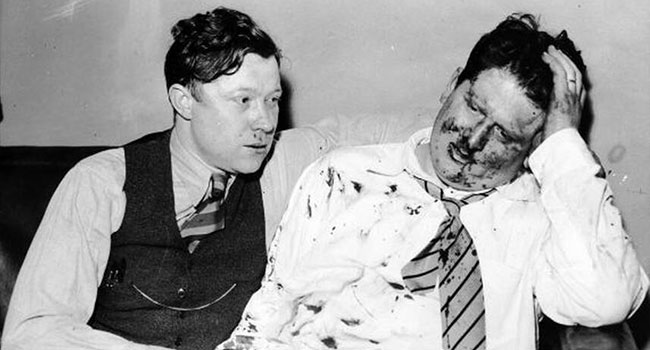 Amity Shlaes’ Great Society is a chronicle of the United States in the mid-20th century. And reading it reminded me of Walter Reuther, a once famous name I’d almost forgotten.
Amity Shlaes’ Great Society is a chronicle of the United States in the mid-20th century. And reading it reminded me of Walter Reuther, a once famous name I’d almost forgotten.
Reuther was a hugely influential player in organized labour and Democratic politics. With the United Auto Workers (UAW) as his power base, he had his finger in everything from labour negotiations to legislation to civil rights to election campaigns. By any definition, he was a man to be reckoned with.
Reuther was born in Wheeling, W.Va., on Sept. 1, 1907. His parents were immigrants from Germany and he was the second oldest of five children.
The family patriarch, Valentine, was a dedicated socialist. And his son was cut from the same cloth.
Right from the get-go, young Walter knew which side he was on. While his sense of right and wrong mightn’t always accord with mainstream perspectives, he wasn’t much given to personal doubt.
As a young man, Reuther became a highly proficient tool and die maker, moved to Detroit, worked the night shift at the Ford Motor Co. and finished his education during the day. He had energy and talent to burn.
Then, in the early 1930s, Walter and his brother Victor embarked on a three-year adventure to Europe and Asia. It included an 18-month stint in the Soviet Union teaching Russian workers how to build Model T cars.
But unlike some other contemporary Western visitors, Reuther’s exposure to Soviet life didn’t make him an admirer of Josef Stalin. He was no political pilgrim.
After returning to the U.S., he launched into what became his life’s work – building his expansive view of trade unionism. It wasn’t to be only about making gains for the membership; general social improvement – as he saw it – was also important.
So Reuther quickly became a labour figure of note. He played a role in the 1937 unionization of General Motors and took his lumps (literally) in the early labour organizing battles. By 1946, he was UAW president.
Reuther was a very successful union leader.
He was a proponent of pattern bargaining, whereby one automobile company was targeted and played off against the others. By moving against the target while leaving its competitors alone, he’d force the desired concessions. Then he’d turn his attention to the others.
In his ability to divide and conquer, Reuther would’ve been a whiz on the 19th century European political stage.
The packages he won were hitherto unprecedented, including things like new health benefits, pension increases and extra days off. There was even a pilot profit-sharing arrangement extracted from American Motors’ George Romney (father of Mitt).
On the broader social stage, Reuther actively supported civil rights – the UAW chipped in to pay Martin Luther King’s bail in 1963 and Reuther was one of only two white speakers at the famous Washington March. He also supported the early activities of the Students for a Democratic Society, which morphed into one of the major entities of the 1960s New Left.
Politically, Reuther shed his early Socialist Party allegiance and threw in his lot with the Democrats. They were, he believed, the most practical way of getting what he wanted, which was to transform the U.S. into a North American version of Scandinavian social democracy.
He was relatively cool to John F. Kennedy, whom he perceived as lacking the requisite passion and commitment. Kennedy, he thought, was a tad too calculating.
Lyndon Johnson, though, was a pleasant surprise before getting mired in Vietnam. And in 1968, Reuther pulled every feasible lever in an ultimately futile effort to drag Hubert Humphrey over the finish line ahead of Richard Nixon.
When Reuther died in a May 1970 private plane crash, there were already stresses in the world he’d laboured so tirelessly to create.
Within the Democratic Party, the middle-class radicals he’d carefully encouraged were warring with the traditional working class that had been the foundation of his efforts. To the voluble radicals, working class ethnic cops were “pigs.”
And the American auto industry – the indispensable cash cow for funding the benefits Reuther delivered – was starting to show the strain of Japanese competition. In part, this was traceable to the rich packages he’d negotiated.
Had he lived, maybe Reuther would’ve found a way of reconciling these contradictions. Or maybe not.
Troy Media columnist Pat Murphy casts a history buff’s eye at the goings-on in our world. Never cynical – well perhaps a little bit.
The views, opinions and positions expressed by columnists and contributors are the author’s alone. They do not inherently or expressly reflect the views, opinions and/or positions of our publication.


